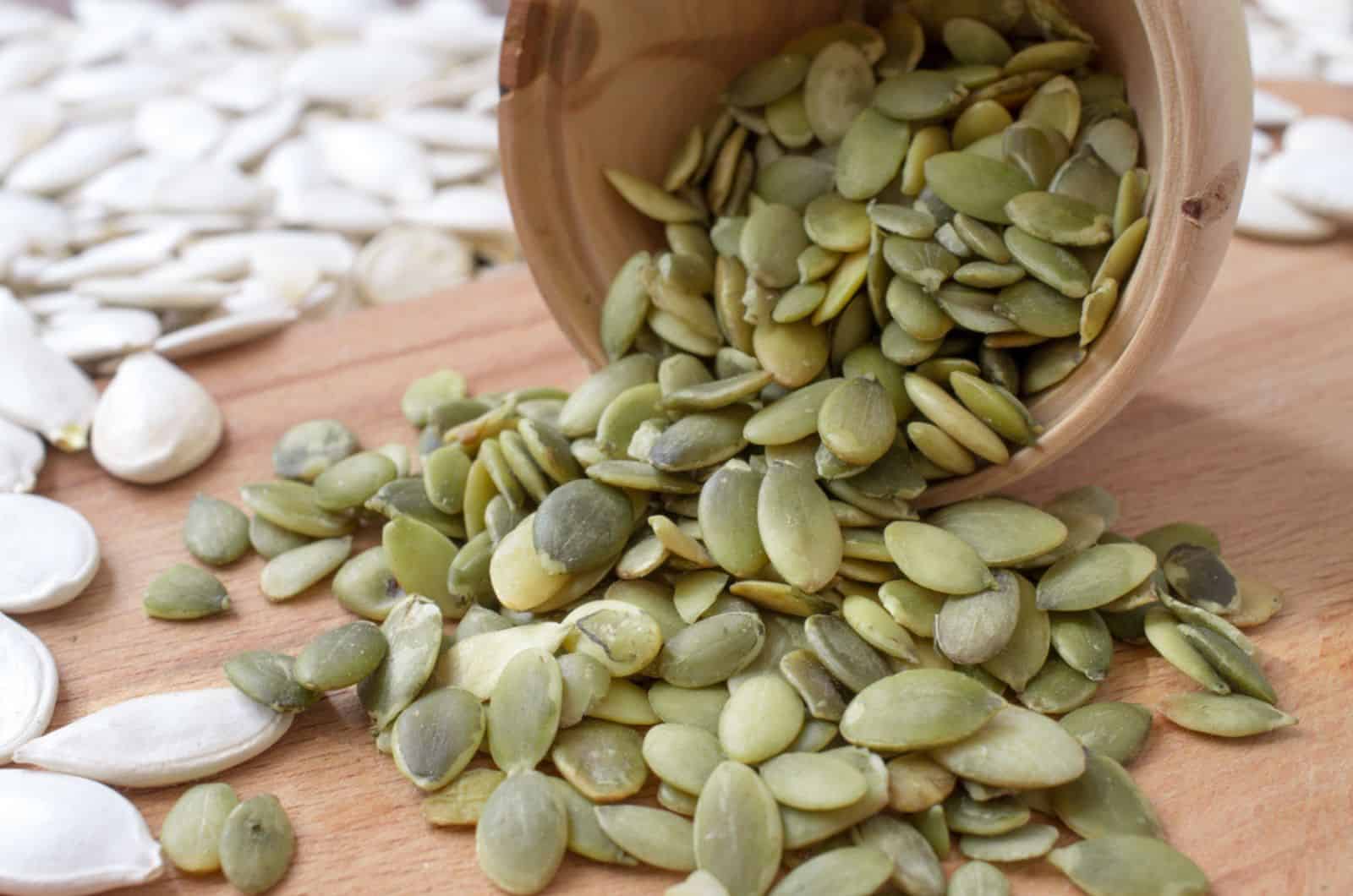Pumpkin pie, pumpkin puree, pumpkin seeds, pumpkin spice latte — there are so many ways in which we humans enjoy pumpkins. But what about dogs? How good or bad are pumpkin seeds for dogs? That is the question that we will be tackling in this article.
While you might have heard a lot of rumors about the benefits and risks of pumpkin seeds for dogs, it can sometimes be difficult to discern what is true and what is a myth.
That’s why we’ve decided to write this article and clear up all the misconceptions about this tasty treat, and highlight all the known benefits of pumpkin seeds for dogs.
Whether it’s boosting their immune system, helping with digestion, or fighting off parasites, pumpkin seeds can be an incredibly useful treat that is safe for dogs and carries a lot of health benefits.
But like practically any other food, there are certain aspects of it that you should be careful about, especially when it comes to the amounts that you should be feeding your dog.
So, without further ado, let’s get into more detail about the benefits of pumpkin seeds for dogs.
How Good Are Pumpkin Seeds For Dogs?
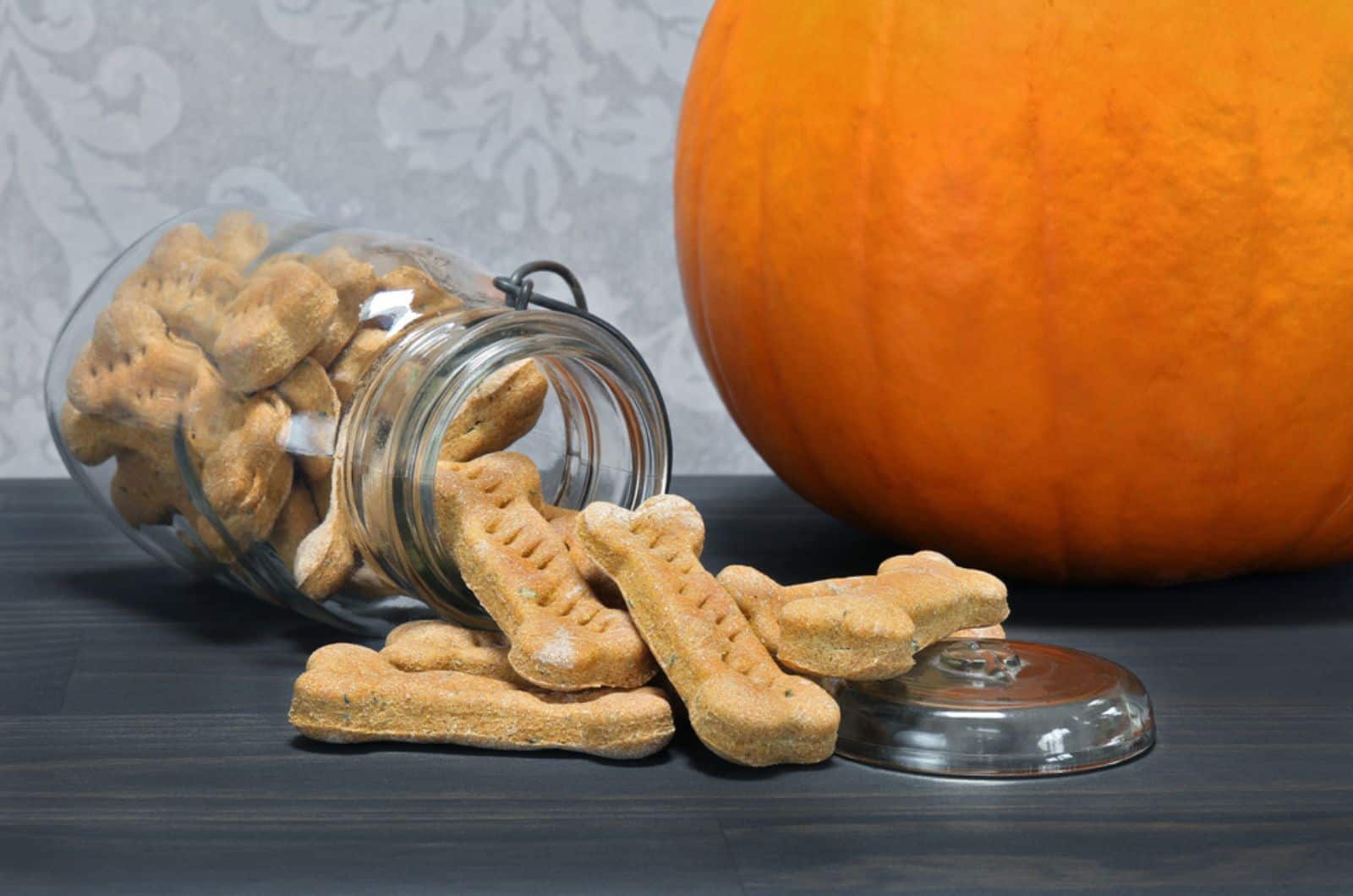
Pumpkins are generally a very healthy food item, at least when it comes to humans. Whether you’re eating a pumpkin pie, pumpkin puree, or even store-bought canned pumpkin, your body is getting a lot of nutritional benefits.
Pumpkins are rich in things like vitamin A, potassium, magnesium, beta-carotene, and various other antioxidants, which together protect your cells from free radicals, keep your blood pressure low, and even help your body build up the strength to fight certain cancers.
And in addition to all that, it’s a very light food that will not make your or your dog’s stomach upset. Those characteristics have led a lot of people to label it a superfood, and it’s not hard to see why.
But what about its seeds? And their impact on a dog’s metabolism, in particular?
While dogs don’t consume pumpkins in the same way that we do — your pooch probably isn’t a fan of pureed pumpkin — they can still eat the seeds, and a lot of them actually find them tasty.
1. Pumpkin Seeds Vs. Worms
There is a ton of information that shows pumpkin seeds are useful in treating tapeworms and other parasites in humans, and the same is true for dogs.
Many veterinarians even advise using pumpkin seeds for worms since they include a variety of phytonutrients that are known for their “toxic” effects on worms by shutting down their nervous systems.
It’s never a bad idea to ask your veterinarian for advice on the right number of seeds to use for your dog’s size and medical history when it comes to deworming.
However, it’s important to note that there are also experts who claim that this is not entirely proven and might just be a tall tale. Speak to your veterinarian and get all the info before taking something as a fact.
In any case, your dog will probably still require additional routine deworming treatments as prescribed by your veterinarian.
Related: Can Dogs Eat Poppy Seeds? The Effects Of Poppy Seeds On Dogs
2. Parasite Prevention
Any intestine or anal gland condition can become more complex by the presence of intestinal parasites.
Giving pumpkin seed fiber to dogs provides them with an amino acid called cucurbitacin, which has the potential to function naturally as a dewormer. This supplement can aid in keeping your pet parasite-free and reducing intestinal inflammation.
The same thing that we said about worms applies to other parasites, as well. Pumpkin seeds alone will not cure your dog, they will merely provide it with some nutrients that will help its body be better equipped to deal with parasites.
You should always follow the advice of a licensed vet and have your dog go through all the necessary vaccinations and other required medical procedures.
3. High Fiber Content
Pumpkins, and particularly pumpkin seeds, are a great source of natural fiber.
A soluble fiber found in pumpkin slows digestion, aids in water absorption in cases of moderate diarrhea, and may also help with mild constipation.
Pumpkin seed fiber, which thickens the stool, also relieves anal gland inflammation and disease by promoting healthy anal gland expression before they become impacted or diseased (helping you avoid repeated trips to the vet).
4. Great For Weight Loss
With the help of pumpkin seeds, overweight dogs can maintain a healthier weight, but as a general rule, seeds should not be the only source of food.
Since they relatively carry a lot of nutritional value in a small package, they can leave your dog feeling full without actually stuffing its body full of calories.
This is great when you’re trying to convince your dog to stick to a regular diet, or when you are trying to gradually decrease its daily calorie intake.
5. Pumpkin Seeds Help Keep Business Regular
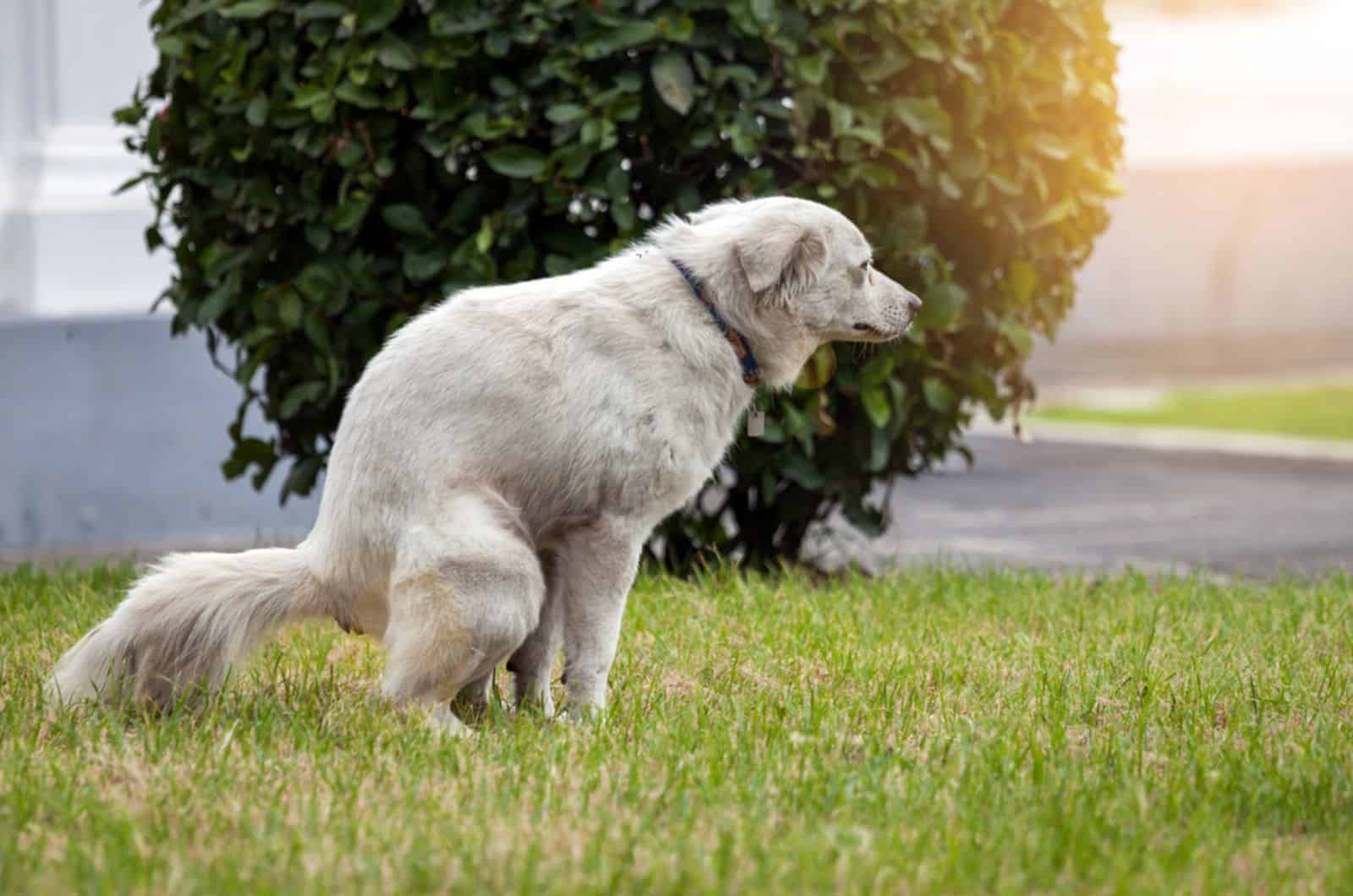
Fiber from adding pumpkin to your pet’s diet can help your dog move stool effortlessly and without putting undue pressure on the intestines. Pumpkin is an effective at-home treatment for loose stools or constipation because of its fiber content!
For dogs struggling with picky stomachs and persistent diarrhea, pumpkin can be a helpful supplement.
Their seeds are a fantastic source of fiber and are loaded with vitamins and minerals, particularly E and K, in addition to minerals such as calcium, potassium, iron, and zinc.
Fiber naturally gives their stools a little extra volume, promoting a healthy digestive system, effective weight management, and more.
6. A Lot Of Antioxidants
Antioxidants shield your dog’s body from harmful free radicals. Damaged cells called free radicals rob chemicals from other cells. They are an organic by-product of metabolism and exposure to environmental pollutants.
Free radicals, however, can damage your dog’s cells and even DNA if they are not dealt with.
These are the antioxidants that can be found in pumpkin: beta-carotene, zeaxanthin, and beta-cryptoxanthin.
Beta-cryptoxanthin and beta-carotene both combine to make vitamin A. Zeaxanthin helps to slow down the aging process, strengthen the heart, raise glutathione levels, and lessen skin inflammation.
Carotenoids aid in reducing the risk of cancer and degenerative diseases. According to studies, they might also be beneficial for bone health.
7. Reduce The Risk Of Inflammations
It has been demonstrated that giving ground pumpkin seeds to dogs has certain anti-inflammatory advantages for intestinal health and anal gland disease.
This results in fewer journeys to the vet’s office in order for those glands to be expressed, as well as less suffering and annoyance for everyone.
8. Improve Eye Health
Vitamin A is the key to good eye health in both humans and dogs. While most of vitamin A is actually found in the meat of the pumpkin itself, there is also a decent amount of it in the seeds.
Eating pumpkin seeds in moderation will help your dog maintain its eyes in perfect condition which will keep him sharp when it comes to spotting any potential intruders. Or, more likely, new napping spots.
9. Packed With Nutrients
For such a small food, pumpkin seeds are surprisingly rich in many nutrients. We’ve mentioned some of them already in various contexts, but it doesn’t hurt to speak about them once again.
Plain old pumpkin seeds contain many useful vitamins and minerals, such as vitamin A, vitamin C, vitamin E, vitamin K, magnesium, and phosphorus, to name a few.
Additionally, they are rich in omega fatty acids, carbohydrates and antioxidants, which make them an incredibly healthy snack that you can have your dog eat instead of its usual dog treats. But don’t let it be all that it eats.
Cons Of Pumpkin Seeds For Dogs

Your dog should be fine as long as seeds aren’t the only food it regularly digests. Before introducing pumpkin seeds to your pet, check with your veterinarian if they have knowledge of any illnesses or conditions they may have.
Small amounts of pumpkin seeds may not do much harm, but too many can result in vomiting, diarrhea, excessive thirst, seizures, or even worse in dogs.
How To Feed Pumpkin Seeds To Dogs
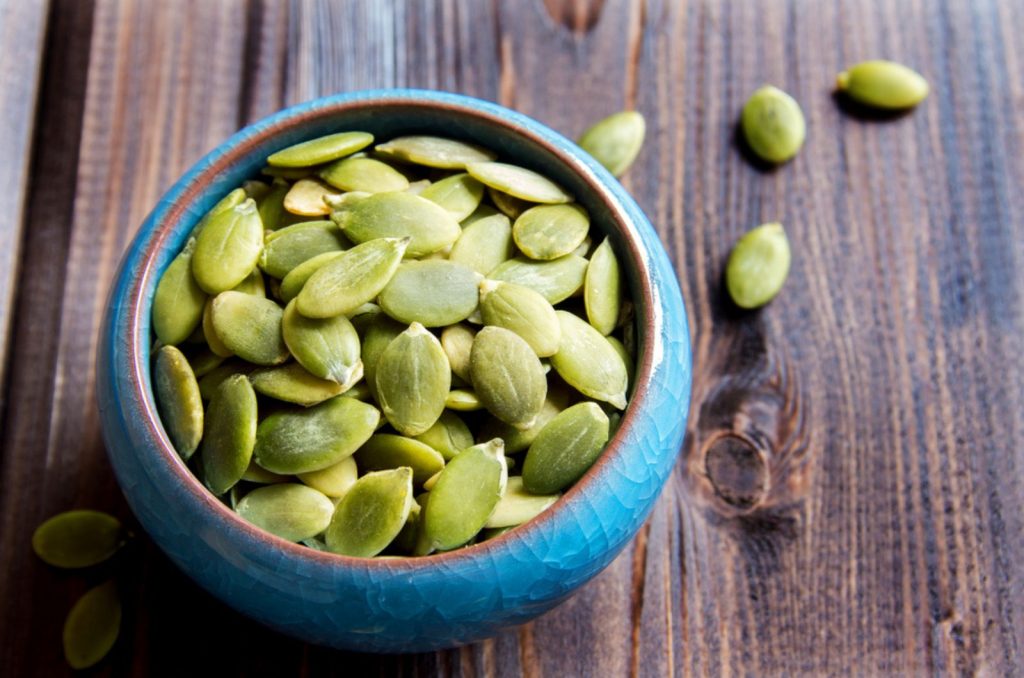
Pumpkin seeds are typically about as big as an average treat and occasionally much simpler to swallow.
You can choose to boil them until they are crispy golden brown, ground them into a powder, or simply feed raw pumpkin seeds, and they will still have a pretty similar effect.
Basically, it comes down to what your dog likes.
That being said, we do have some tips on how to get the best out of pumpkin seeds for dogs.
Don’t Add Any Spice
Just be careful about the type of pumpkin seeds you give your dog. Raw seeds are typically sold in grocery shops, however, they could be placed among seeds that have salt, spices, or other artificial additives. Natural is always best, as is the case with most things.
Read next: Can Dogs Eat Spicy Food And Is It Safe For Them?
Be Mindful Of Allergies
Check for allergies to pumpkin seeds. Give your dog a few seeds and watch how they respond. Stop giving them pumpkin seeds as soon as they exhibit any unfavorable symptoms, such as diarrhea, loss of appetite, vomiting, or stomach pain, and contact a veterinarian right once.
Don’t Feed Your Dog Pumpkin Seed Shells
Take away the shells before you give the seeds to your pooch. Dogs can choke on and get digestion problems from shells. To extract the seed from the shell of a pumpkin seed, we advise boiling or rolling the seed.
Roast The Seeds Carefully
The best course of action is to roast pumpkin seeds completely plain, with no oil, salt, or other seasonings added.
Even if you might be tempted to add some extra flavor for your dog, you should know that this will not actually have any real benefits, and it might even be counter-productive.
Ground The Seeds
To ensure optimum digestion, you should consider grounding pumpkin seeds into a powder. This lessens the possibility of intestinal discomfort or obstruction.
Once you turn it into a powder, you can then feed it to your dog on its own or mix it up with some regular dog food.
Keep It In Moderation
Serve in moderation and in small portions.
Although dogs can safely consume pumpkin seeds, eating too many can have negative effects. Three to five seeds a day can be safely consumed by small dogs, five to ten by medium dogs, and ten to twenty seeds by large dogs.
Homemade Pumpkin Seed Recipes For Dogs
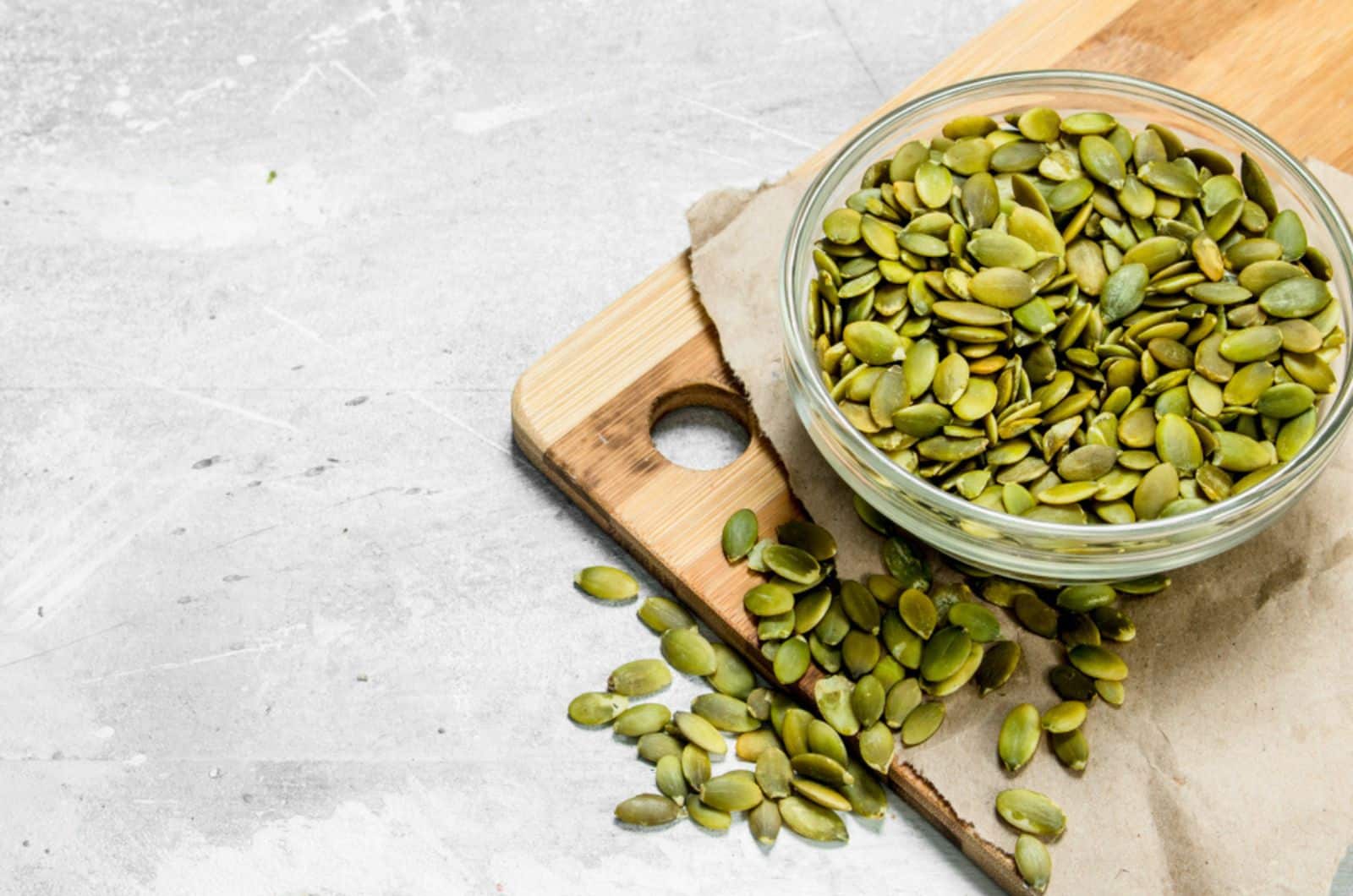
After speaking in length about the health benefits of pumpkin seeds for dogs, it would be remiss of us not to include at least a couple of tasty recipes that will allow you to test these theories.
Food that has a lot of spice or various condiments typically isn’t fit for dogs, so the number one rule of thumb when making homemade food for your pup is to leave it plain.
Don’t experiment with sauces or spices, because they won’t add anything beneficial, and your dog won’t even notice the difference in taste.
Dogs are simple creatures.
So, with that in mind, let’s move on to a couple of really yummy dog food recipes that are based on pumpkin seeds.
Roasted Pumpkin Seeds
Our first recipe is a really simple one that you can make in about 15 to 20 minutes. Simple roasted pumpkin seeds don’t really require a lot of work and they can be a great treat for your canine companion.
Ingredients
Here is everything that you will need for this simple, but tasty, dog snack recipe:
- raw pumpkin seeds
- a big baking tray
- a grinder
Instructions
Now that you’ve got everything that you need, you can start with the preparation.
The first thing that you will need to do is preheat the oven. We recommend that you set it to a temperature of 300°F (that’s about 150 degrees for all of you Celsius folks out there).
While the oven is getting warmed up, you can remove the seeds from their shells, clean them in some water, and gently dry them off with a paper towel.
Spread the cleaned seeds out across your baking tray. The tray should be big enough comfortably hold all the seeds with enough distance between them. You don’t want them all heaped together.
When the oven is ready, place the tray inside and set a timer for 15 minutes.
When the timer runs out, pull out the tray with the roasted pumpkin seeds out of the oven and let them cool off for a while before serving them to your dog.
At this point, you can make a decision whether you want to feed them whole to your dog or grind them up into a fine powder. If you choose the latter and decide to sprinkle them on your dog’s food, use a coffee bean or spice grinder.
When storing the roasted seeds for later, make sure to use an air-tight container.
Pumpkin Seed Biscuits
Moving on from roasted pumpkin seeds, we get to something a bit more complex and time-consuming, but not too much!
These pumpkin biscuits are a true delicacy and will probably leave your dog begging for more. Make sure that you are immune to puppy eyes before baking this treat, otherwise, the whole tray will be empty before you know it!
Ingredients
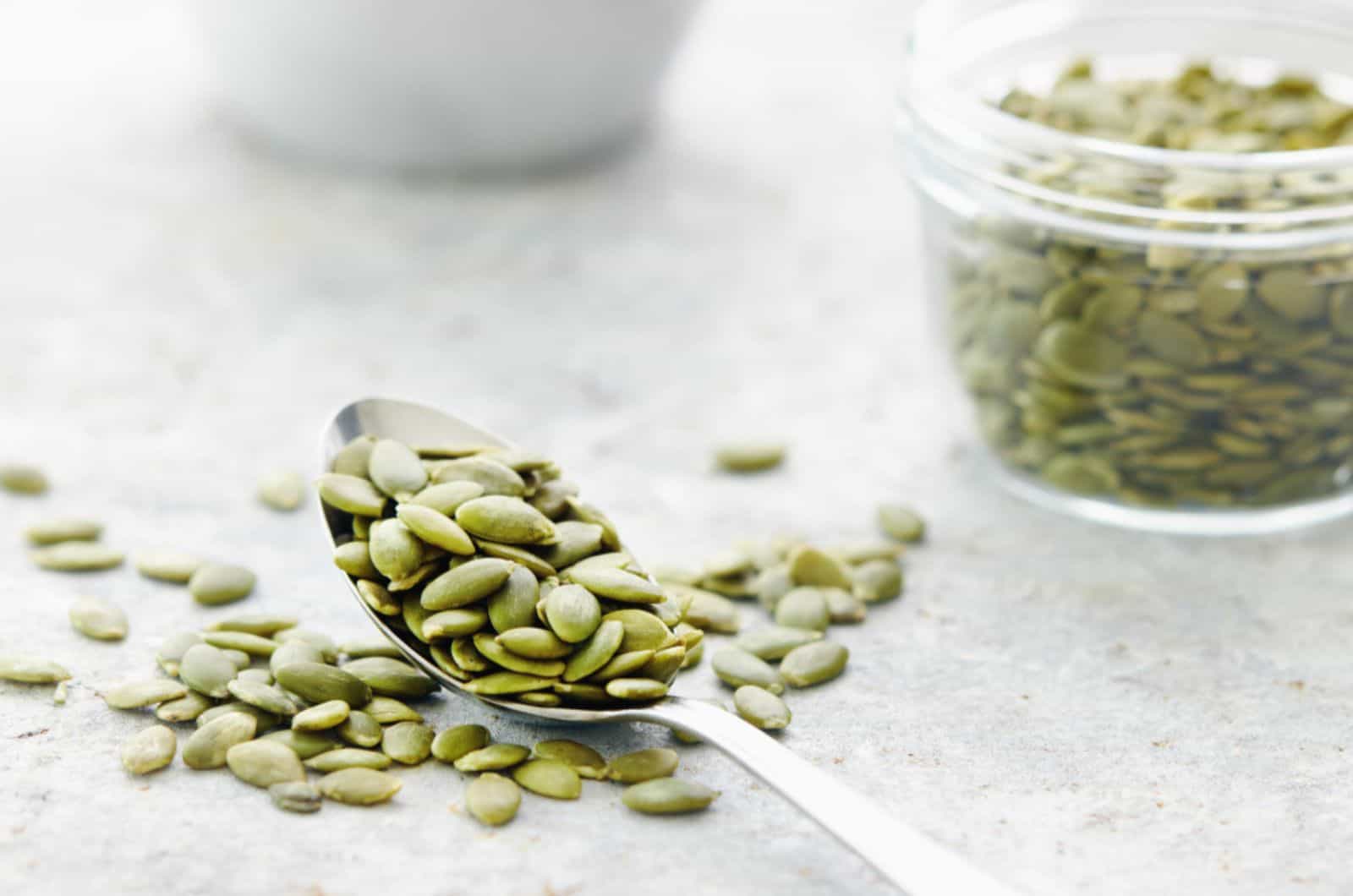
Before starting the process of baking, here are all the ingredients that you should prepare:
- 1 cup of raw pumpkin seeds
- 2 apricots (as an alternative, you can use carrots, or even pumpkin, if you want to keep with the theme)
- plain applesauce
- smooth and plain peanut butter
- 1 egg
- 1 cup of flour
Instructions
Did you get everything you need? Okay, then now is the time to get your baking hat on and get started with these delicious pumpkin seed biscuits for your doggie.
First things first, preheat your oven to a temperature of 350°F (176°C). Then place the pumpkin seeds onto a baking sheet, put it into the oven, and bake the seeds for an hour.
Once the seeds are baked, set some of them aside in order to make a cup of pumpkin seed powder. You can use a coffee grinder, a spice grinder, or a food processor for this part.
Now it’s time to turn to the apricots (or carrots, or raw pumpkin — whichever you have chosen). We’re going to be making a puree! Peel the apricots that you have prepared, remove their pits, put them into a food processor, and mash them into a nice, smooth puree.
Then take the puree and put it in a clean bowl. Add the egg to it, as well as three tablespoons of peanut butter and ¼ cup of applesauce. Remember, both the peanut butter and the applesauce should be plain and without any additives.
After you’ve successfully done that, get another bowl. We will be using this one for the dry ingredients. Get the pumpkin seed powder from before and mix it with the flour (the whole cup) in the bowl.
The next step is to make dough. Combine the dry and wet ingredients to form a semi-wet dough and then knead it with your hands.
Free up a cutting board or a countertop and cover it thinly with some flour. Use a rolling pin to spread the dough across this surface, making it about one-quarter to one-half of an inch thick.
That big layer of dough will be your basis for the biscuits. Grab a cookie cutter and start cutting out the dough. If you have a bone-shaped cutter, that would be perfect!
After you’ve cut out the biscuits, place them on a baking tray that has been lined with a baking sheet, and put them in the oven. Bake them for 15 to 25 minutes, which is enough time for them to start firming up.
Once they’re finished, take them out of the oven and put them somewhere they can cool off.
Conclusion
So those were some of the benefits of pumpkin seeds for dogs. We’ve created this article as a sort of guideline for dog owners who were unsure about feeding pumpkin seeds to their pets.
We hope that it has cleared up any misconceptions you might have had and given you a couple of ideas for how to incorporate pumpkin seeds into your dog’s diet.
Pumpkins are generally very healthy food, because they are rich in things like vitamin A, potassium, magnesium, and beta-carotene.
They are practically a superfood and a wonderful home remedy for humans, and they bring a lot of benefits to dogs, as well. However, as with anything in life, you should always practice moderation, and make sure that pumpkin seeds don’t become your dog’s main source of nutrition.
Pumpkin seeds for dogs work best as an additional source of nutrients, or as an occasional tasty treat that complements their regular diet.
